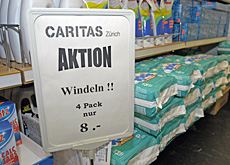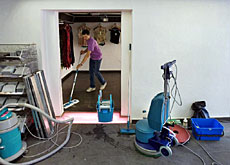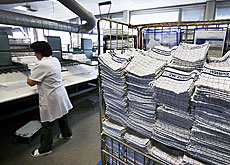Charity supermarket exposes Zurich’s wealth gap

The disparity between Zurich's rich and poor is continually widening, according to the operators of a charity supermarket recently opened in the city.
Catholic charity Caritas estimates that 20,000 locals living below the poverty line could benefit from the shop that sells groceries at up to 30 per cent cheaper than high street stores.
The supermarket, which opened in the northern district of Oerlikon in July, challenges Zurich’s image as a well-heeled city of banks and luxury shops, according to manager Christina Jetzer.
“The complete picture of Zurich is not just of banks and money because the whole spectrum of society lives here,” she told swissinfo.
“Because Zurich is so rich it costs more to live here and this affects the poor proportionally more than in other parts of Switzerland.”
In its first three months of trading Oerlikon’s Caritas supermarket has issued 2,000 shopping cards to welfare organisations. People who want to take advantage of the low cost products must prove they are on low incomes before they are given a card that allows them to shop there.
The shelves are stacked with a range of branded goods from food and drink to cosmetics, shampoo, nappies and baby toys.
The products come from other supermarkets such as Coop and Migros or direct from suppliers because they are nearing sell-by dates or are batches that have been overproduced.
Chocolate and cheese
Caritas has contracts with major Swiss food suppliers such as Nestlé, and dairy and cheese producers, Emmi and Baer. In many cases the charity gets the goods for free and only pays transport costs.
The location for the supermarket was chosen because it is in one of the poorest districts of Zurich. Caritas calculates that up to 11 per cent of the local population relies on social benefits compared with an average of 6.6 per cent across the city.
Jetzer believes the higher cost of living in recent years combined with a relatively low increase in wages is to blame for the widening gulf between rich and poor throughout the country.
“In the past Switzerland had a lot of middle class people who earned enough to live comfortably. But salaries have not matched the growing cost of providing for families,” she said.
“Now there is a general feeling in Switzerland that many families are in danger of becoming poor if they have a third child.”
Long term jobless
The supermarket has become one of the first enterprises to sign up to the city’s low paid subsidised jobs scheme that aims to get the long-term unemployed back to work.
Caritas has filled eight of the 12 vacancies paying between SFr1,600 ($1,288) and SFr3,200 per month, half funded by the charity and half by the city’s welfare department.
The goal of the scheme is to funnel people back into the job market by offering training and experience in such positions that pay marginally more than welfare benefits.
One employee at Oerlikon’s Caritas supermarket, who could not be named, jumped at the opportunity after being unemployed for three years.
The 50-year-old woman found work at Zurich airport after moving to Switzerland from Kenya only to be made redundant with the collapse of former national airline carrier Swissair. Subsequent jobs were short-lived until she finally ran out of options.
“Welfare payments only gave me enough to pay for my apartment, health insurance and food. The wages here are not much higher, but they do at least let me pay the bills that had been stacking up,” she told swissinfo.
“This is a step up to help me integrate into normal working life again. It is better to be working than just sitting at home because it is more attractive to employers to see that I am gaining experience and that I’m prepared to be flexible.”
swissinfo, Matthew Allen in Oerlikon, Zurich
The Caritas supermarket in Oerlikon was the 13th such store to open its doors in Switzerland since 1992. A 14th shop is planned to start trading in Chur this autumn.
The charity has calculated that customers spend on average SFr15 each time they visit one of their supermarkets.
The Oerlikon store is projected to exceed SFr10,000 turnover by the end of this year. That is expected to reach more than SFr30,000 by the end of 2007 and at least SFr500,000 in 2009.
The official poverty line in Switzerland is calculated as a net monthly income of SFr2,480 ($1,997) for a single person and SFr4,600 for a family with two children.
Official statistics from 2004 showed that 12.5% of residents in Switzerland live below the poverty line.
A Federal Statistics Office report released in May this year, based on 2004 figures, revealed that 3% of the population live on welfare benefits.
Earlier this month Zurich city authorities said they want to extend the low paid job scheme, originally launched last year, to get more long term unemployed back into work. It now wants to raise the number of positions from 215 to 500 at a cost of an extra SFr10 million in the next three years.

In compliance with the JTI standards
More: SWI swissinfo.ch certified by the Journalism Trust Initiative











You can find an overview of ongoing debates with our journalists here . Please join us!
If you want to start a conversation about a topic raised in this article or want to report factual errors, email us at english@swissinfo.ch.